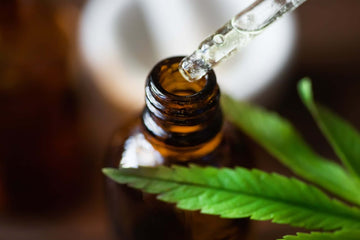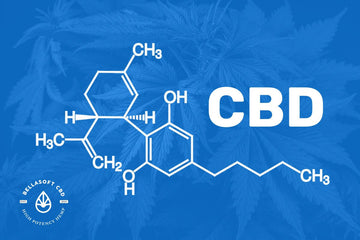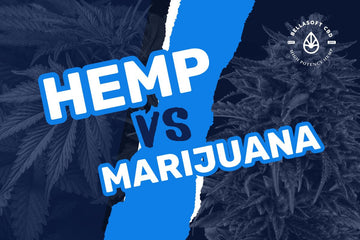In recent years, CBD has surged in popularity, appearing in everything from wellness products to skincare routines. But what exactly does CBD do, and why is it gaining so much attention? Whether you’re curious about its calming effects, potential health benefits, or simply want to understand how it works, this article is your guide to uncovering the truth about CBD.
Cannabidiol (CBD) is a natural compound derived from the hemp plant, known for its non-psychoactive properties. Unlike THC, CBD doesn’t get you high, but it does interact with your body in unique ways. From easing stress and promoting relaxation to supporting overall wellness, CBD’s potential effects are vast and varied.
In this article, we'll explore the science behind CBD, breaking down its effects on the body and mind, and discussing the potential benefits it offers. Whether you're a seasoned user or just beginning to explore the world of CBD, understanding its impact can help you make informed decisions about incorporating it into your lifestyle.
Key Takeaways
-
CBD interacts with the body's endocannabinoid system to promote balance.
-
Potential benefits include pain relief, reduced anxiety, and improved sleep.
-
Effects on the mind include stress reduction and enhanced mood.
-
Always consult a healthcare provider before starting CBD, especially if on medication.
-
The legal status of CBD varies by location; check local laws.
-
Choose high-quality CBD products by verifying third-party lab tests.
-
Start with a low dose and gradually increase to find the optimal amount for you.
Getting to Know Cannabidiol

The Basics of CBD
CBD stands for cannabidiol. It is a compound found in cannabis plants. Unlike THC, CBD does not cause a high. CBD products are often used for their therapeutic benefits.
How CBD Works
CBD, or cannabidiol, works by interacting with the body's endocannabinoid system (ECS), a complex network of receptors and neurotransmitters that help regulate various physiological processes, such as mood, pain perception, and immune response. CBD doesn’t directly bind to cannabinoid receptors like THC does; instead, it influences the ECS by enhancing the body's natural production of endocannabinoids and modulating receptor activity. This interaction helps maintain balance, or homeostasis, within the body, potentially contributing to feelings of calm, reduced discomfort, and overall wellness without the psychoactive effects associated with THC.
CBD and THC: The Key Difference
CBD and THC are both cannabinoids. However, they have different effects on the body. THC is psychoactive and can make people feel high. CBD use does not produce this effect. This makes it more appealing for medical treatments.
Popularity of CBD Products
The popularity of CBD products has grown rapidly. People use them for various health issues. These include anxiety, pain, and sleep problems. The market offers many forms of CBD treatment such as oils, capsules, and creams.
Therapeutic Potential
Many people believe in the health benefits of CBD product. Studies suggest that it may help with:
-
Reducing anxiety
-
Easing chronic pain
-
Improving sleep quality
-
Supporting pet wellness
These benefits attract more users every day.
Legal Status
In most states, CBD use is legal if it comes from hemp. Hemp-derived CBD contains less than 0.3% THC. This low level of THC makes it non-psychoactive and legal under federal law.
How CBD Works in the Body

Endocannabinoid System
The endocannabinoid system (ECS) helps maintain balance in the body. It regulates many functions like sleep, mood, and appetite.
The ECS consists of endocannabinoids, receptors, and enzymes. Endocannabinoids are molecules made by the body. They bind to receptors to signal that the ECS needs to take action.
ECS Receptors
CBD interacts with two main receptors in the ECS: CB1 and CB2. CB1 receptors are mostly found in the brain and central nervous system. They affect coordination, pain, and mood.
CB2 receptors are located in the immune system and other parts of the body. They influence inflammation and pain.
Neurotransmitter Modulation
CBD can also modulate neurotransmitter release. It may increase levels of serotonin, which affects mood and anxiety.
CBD might reduce levels of certain chemicals that cause stress. This modulation can help maintain emotional balance.
Blood Interaction
CBD enters the bloodstream after consumption. It travels through the blood to reach various parts of the body. This allows it to interact with ECS receptors wherever they are located.
Muscle Benefits
CBD may help relax muscles by interacting with CB2 receptors. This can reduce muscle tension and discomfort. Some athletes use CBD to aid muscle recovery after exercise.
Potential Health Benefits of CBD

Chronic Pain Relief
CBD may help with chronic pain. Studies show that cannabinoids, including Cannabidiol (CBD), interact with receptors in the brain and immune system. This can reduce inflammation and pain signals.
A 2018 review examined research from 1975 to 2018. It found that CBD can relieve pain from conditions like arthritis and multiple sclerosis. Many people use medical cannabis, including Cannabidiol (CBD), for its pain-relieving properties.
Anxiety and Depression Reduction
CBD might reduce anxiety and depression. Clinical trials suggest that it affects serotonin levels in the brain. Serotonin is a neurotransmitter linked to mood regulation.
A study published in the Journal of Psychopharmacology showed promising results and studies CBD posses anti-inflammatory properties. Participants with social anxiety disorder experienced less anxiety after taking CBD. This suggests a potential benefit for mental health issues.
Anti-Inflammatory Properties
CBD has anti-inflammatory properties. These can benefit skin conditions like acne and psoriasis. It interacts with the endocannabinoid system, which regulates skin health.
Research in the Journal of Clinical Investigation found that CBD lowers sebum production. Sebum is an oily substance that can cause acne. By reducing inflammation, cannabinoids may improve overall skin health.
Heart Health Support
CBD may support heart health. It can lower blood pressure and reduce stress on the cardiovascular system. High blood pressure is a risk factor for many heart conditions.
A study in JCI Insight examined nine healthy men. They experienced reduced blood pressure after taking CBD oil. This suggests potential benefits for heart health and overall wellbeing, to help support improved sleep quality.
Cancer Pain Management
CBD might help manage cancer pain. Patients undergoing cancer treatment often experience severe pain. Traditional painkillers sometimes fail to provide relief.
Research indicates that cannabis plant extracts, including CBD, can alleviate cancer-related pain. A study in the European Journal of Pain found significant pain reduction in cancer patients using CBD.
Effects of CBD on the Mind

Anxiety Relief
CBD has shown promise in reducing anxiety. Studies suggest that it can help people with generalized anxiety disorder (GAD). Participants reported feeling calmer after taking CBD.
Human studies have also explored its effects on social anxiety, as cbd interacts with receptors in the body. Some found that CBD reduced anxiety symptoms during public speaking tasks. This suggests a potential for CBD to alleviate situational anxiety.
Impact on Depression
Depression affects millions worldwide. CBD may offer some relief. Research indicates that CBD might influence serotonin levels in the brain. This neurotransmitter plays a key role in mood regulation.
In one study, participants with depression symptoms experienced improvement after using CBD. They reported feeling less hopeless and more motivated.
PTSD Management
Post-traumatic stress disorder (PTSD) is a severe condition. It can cause flashbacks, nightmares, and severe anxiety. Some studies show that CBD can reduce PTSD symptoms.
Veterans with PTSD have used CBD to manage their condition. They reported fewer nightmares and better sleep quality. This suggests CBD's potential impact on PTSD.
Cognitive Benefits
CBD may enhance cognitive functions like focus and clarity. Anecdotal evidence suggests that users feel more alert and focused after taking CBD. This can be particularly helpful for those with attention disorders.
e studies also indicate that CBD might protect brain health. It could potentially reduce inflammation and oxidative stress in the brain, studies CBD posses anti-inflammatory properties. These factors are linked to cognitive decline.
Sleep Quality
Many people struggle with sleep issues. CBD might improve sleep quality by addressing underlying causes like anxiety or pain.
Studies show that CBD can help people fall asleep faster and stay asleep longer. Users often report waking up feeling more refreshed. This improvement in sleep patterns can lead to better overall health.
Seizure Control
CBD is well-known for its effectiveness in treating epilepsy. The FDA has approved a CBD-based drug called Epidiolex for seizures.
Clinical trials showed significant seizure reduction in patients using Epidiolex. This highlights CBD's impact on seizure control and its potential as a treatment option.
Safety and Side Effects of CBD
Common Side Effects
CBD is generally well-tolerated. However, some people may experience side effects. The most common side effects include:
-
Dry mouth
-
Dizziness
-
Changes in appetite
Dry mouth can be uncomfortable but is not dangerous. Dizziness usually occurs when standing up quickly. Changes in appetite might lead to weight gain or loss.
Adverse Effects
While rare, there are some adverse effects. These can include:
-
Diarrhea
-
Fatigue
-
Interactions with medications
Diarrhea and fatigue are less common but can occur. It's crucial to monitor these symptoms.
Starting with Low Doses
Starting with low doses is important. It helps gauge individual tolerance. Gradually increase the dose if necessary. This method reduces the risk of severe side effects.
Consulting Healthcare Providers
Always consult healthcare providers before starting CBD. This is especially important if you are on other medications. CBD can interact with certain drugs, causing adverse effects.
Healthcare providers can guide you on safe dosages. They can also monitor for any interactions.
Legal Status of CBD

Federal Laws
The federal legal status of CBD in the United States is complex. The 2018 Farm Bill legalized hemp-derived CBD with less than 0.3% THC. This means that CBD products meeting these criteria are legal federally. However, the FDA still regulates CBD in food, beverages, and supplements.
State Laws
State laws regarding CBD vary widely. Some states have fully legalized CBD for medical and recreational use. Others allow only medical use or restrict it further. For example:
-
In California, both medical and recreational CBD are legal.
-
In Idaho, all forms of CBD are illegal unless it contains zero THC.
It's important to check local regulations before purchasing or using CBD products.
International Views
Globally, the legal status of CBD differs from country to country. In Canada, CBD is fully legal for both medical and recreational use. In contrast, countries like Japan allow only THC-free CBD products. The European Union has a patchwork of regulations, with some countries allowing full access and others imposing strict controls.
Different Ways to Take CBD

Oral Methods
CBD can be taken orally in several ways. CBD Oil Tinctures, like our Broad Spectrum CBD Oil (available in human blends and pet blends), are generally the most popular due to their ease of use.
They come in small bottles with droppers. You place a few drops under your tongue. This method allows quick absorption into the bloodstream.
Capsules are another option. They look like regular pills and are easy to swallow. Dosing is simple with capsules since each one contains a specific amount of CBD.
Last but not least are edibles, which includes chocolates, beverages, lozenges, and gummies. Formulated as a delicious treat, CBD gummies like our Raw Honey Infused CBD Gummies offer an easy, convenient, and tasty way to support your daily wellness.
Topical Applications
Topical CBD products provide localized relief. These include creams, balms, and lotions. You apply them directly to the skin where you need relief.
While these types of topicals are used to support skinacare, others like our powerful Cooling CBD Muscle Roll-On, are formulated to offer targeted relief to pain, stiffness, and soreness.
Inhalation Options
Inhaling CBD is another effective method. Vaping involves using a vaporizer to inhale CBD oil. This allows for quick absorption into the lungs.
Smoking CBD flower is also an option. This involves burning the flower and inhaling the smoke. Both vaping and smoking offer fast relief but may not be suitable for everyone.
Choosing Quality CBD Products

Third-Party Lab Testing
Third-party lab testing is essential. It ensures product purity and potency. Labs test for contaminants like heavy metals and pesticides. They also verify the CBD content. Look for a Certificate of Analysis (COA). This document provides detailed product information.
Organic and Non-GMO Certifications
Organic and non-GMO certifications are important. These labels indicate high-quality products. Organic farming avoids synthetic chemicals. Non-GMO means the plant extract is not genetically modified. Both certifications ensure a natural and pure product.
Brand Reputation
Researching brand reputation is crucial. Check customer reviews and ratings. Reputable brands often have positive feedback. Look for consistent quality in their products. Reliable brands provide transparent product information.
Customer Reviews
Customer reviews offer valuable insights. They reflect real-life experiences with the product. Positive reviews indicate effective treatment results. Negative reviews highlight potential issues. Always consider the overall rating and specific comments.
Product Types
Various CBD products exist, including oils, capsules, and dietary supplements. Oils are popular for their versatility. Capsules offer convenience and precise dosing. Dietary supplements can be integrated into daily routines easily.
Ingredients List
Check the ingredients list carefully. Ensure there are no harmful additives or fillers. The main active ingredient should be clearly listed. High-quality products use minimal ingredients for maximum effectiveness.
Legal Compliance
Ensure the product complies with local laws. The 2018 Farm Bill legalized hemp-derived CBD in the U.S., but regulations vary by state. Verify that the product meets legal standards to avoid any issues.
Tips for First-Time Users

Start Low
Begin with a small dose. This approach helps to observe how the body reacts. Taking too much CBD initially can lead to unwanted effects.
Gradually increase the dosage if necessary. Patients often find this method effective in managing their symptoms without overwhelming their system.
Keep a Journal
Track your CBD usage in a journal. Record the dosage, time of day, and any observed effects. This can help identify patterns and optimize usage.
Note any side effects as well. Researchers recommend this practice to monitor how different dosages affect people individually.
Seek Professional Advice
Consult healthcare professionals before starting CBD. They can provide guidance based on medical history and current medications.
Experienced users can also offer valuable insights. Authors in medical journals suggest that consulting both sources may reduce risks associated with improper use.
Monitor Symptoms
Pay attention to changes in symptoms after using CBD. This includes pain relief, anxiety reduction, or improved sleep.
If symptoms persist or worsen, adjust the dosage accordingly. Research shows that monitoring these changes is crucial for effective treatment.
Understand Risks
Be aware of potential risks associated with CBD use. Some people may experience side effects like dizziness or dry mouth.
Long-term effects are still under study. Researchers advise caution and recommend regular check-ups to ensure safety.
Ready to Find Out What CBD Can Do For You?

CBD offers a range of potential benefits for both your body and mind. From easing chronic pain to reducing anxiety, CBD Roll-Ons can deliver targeted relief, making it a versatile tool in your wellness arsenal. Always choose quality products and start with a low dose to find what works best for you.
Ready to dive deeper? Explore the Bellasoft Blog for more helpful guides. If you found this useful, share it with friends. Check out Bellasoft CBD's oils, roll-ons, pet care, and gummies for top-notch options. Your journey to better health starts now!
Frequently Asked Questions
What is CBD?
CBD, or cannabidiol, is a natural compound found in cannabis plants. It does not produce a 'high' and is often used for its potential health benefits as cbd interacts with receptors in the body.
How does CBD work in the body?
CBD interacts with the endocannabinoid system (ECS), which helps regulate functions like sleep, mood, and pain. This interaction may contribute to its therapeutic effects.
What are the potential health benefits of CBD?
CBD may help with anxiety, pain relief, and inflammation. Some studies suggest it could also aid in managing epilepsy and insomnia, to help support improved sleep quality, and cbd can help improve the mood.
Are there any side effects of using CBD?
Common side effects include fatigue, diarrhea, and changes in appetite. Always consult a healthcare provider before starting any new supplement.
Is CBD legal?
The legality of CBD varies by location. In many places, it's legal if derived from hemp with less than 0.3% THC. Always check local laws.
What are different ways to take CBD?
CBD can be taken as oils, capsules, edibles, vapes, and topicals. Each method has different onset times and durations of effect.
How do I choose quality CBD products?
Look for products that have third-party lab testing, clear labeling, and positive customer reviews. Ensure they are sourced from reputable manufacturers.





